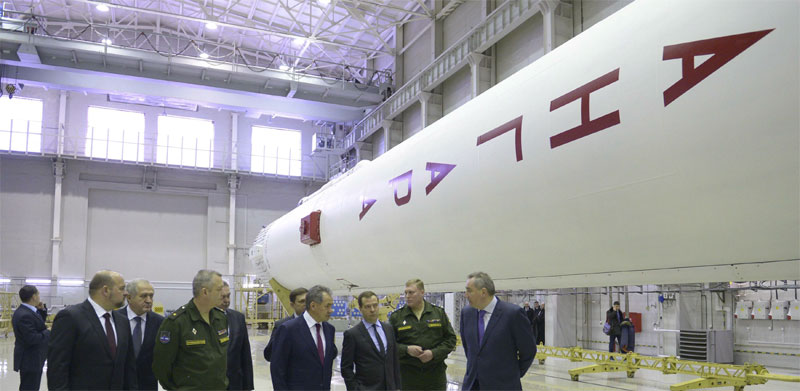Reuters/Moscow
Russia launched its first new design of space rocket since the Soviet era from the northern military site of Plesetsk on Wednesday, aiming to break its reliance on foreign suppliers as well as the Baikonur cosmodrome in Kazakhstan.
The Angara rocket's quiet debut was in marked contrast to a live broadcast of an embarrassing aborted first launch attempt watched by President Vladimir Putin from the Kremlin.
"Angara is here!" tweeted Russian Deputy Prime Minister Dmitry Rogozin after the successful flight of a rocket that was more than two decades in the works.
The new generation rockets - designed to carry a full range of civilian and military payloads - are a key to Putin's effort to reform a once-pioneering space industry hobbled by years of budget cuts and a brain drain in the 1990s.
The Angara-1.2PP trial rocket blasted off at 4 p.m. Moscow time (1200 GMT) on a 21 minute suborbital flight 5,700 km (3540 miles) across Russia's Arctic coast line, the Russian Defence Ministry said in a statement.
Images of the pencil-thin Angara-1.2PP trial rocket powered by an orange jet flame into the cloudy skies were later shown on Russian state television.
"This is an entirely new rocket," Alexander Golovko, commander of Russia's Air and Space Defence Forces told the channel. "It has proved its ability."
Work on the Angara began after the break-up of the Soviet Union when Moscow lost the maker of its Zenit and Dnepr rockets as well as the Baikonur launch site, based respectively in the newly independent republics of Ukraine and Kazakhstan.
For some industry insiders, the crisis in Moscow's relations with Ukraine over its annexation of Crimea proves Russia's need to produce and launch its rockets domestically.
"We are disentangling ourselves from our dependence on other states for military launches," said Igor Marinin, editor of the trade journal Novosti Kosmonavtiki.
FIRST RUSSIAN ROCKET
The Angara rocket is the first entirely designed and built within post-Soviet Russia's borders - ordered by then President Boris Yeltsin in the 1990s.
"Everything else we have is a modernisation of our Soviet legacy," Russian space industry expert Igor Lissov said.
A potential commercial rival to Arianespace of France and Californian-based SpaceX, a heavier version of the modular launcher is designed to replace Russia's workhorse Proton rocket, which has suffered an embarrassing litany of failures.
That model is due to tested later this year.
Unlike the Proton, powered by toxic hydrazine fuel, Angara uses an ecologically cleaner mix of liquid oxygen and kerosene.
Industry experts estimate its development has cost billions of dollars, and the Angara rockets will only become commercially viable in another decade if launched from a new Vostochny cosmodrome Russia is building in the far east.
Angara - named after a Siberian river - is made by the same builder, the Khrunichev space centre, as the ill-fated Proton.
"Twenty years of development is over but we are at the very beginning of the flight testing," Anatoly Zak, editor of the Russianspaceweb.com industry news site.
The designer of the first stage RD-191 engine, Energomash, blamed the failure on its first trial launch on a drop in the pressure of the liquid oxygen tank.

